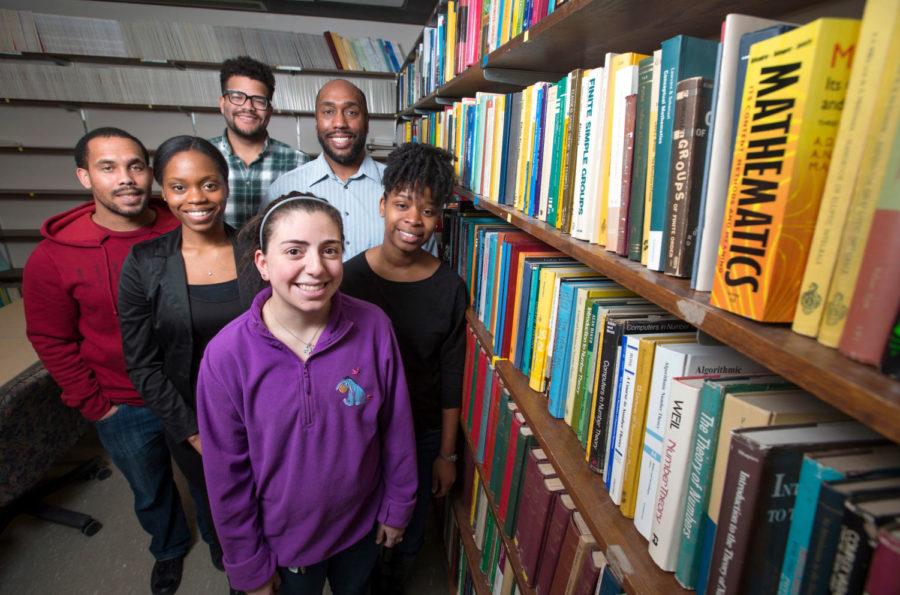Grad students discover inclusiveness, support with MOCA
Courtesy of Christopher Gannon/Iowa State University News Service
The Mathematicians of Color Association (MOCA) is an organization made up of minority and underrepresented students aiming to provide them with a support system.
January 25, 2017
When Shanise Walker first arrived at Iowa State for a summer research program in 2011, she decided she wanted to return to Ames to continue her graduate school career the next year.
Walker is now in her fifth year of studying discreet math and extremal graph theory in pursuit of a doctorate in mathematics.
“I applied to different schools, but I felt like the culture here amongst the faculty and students was very inviting,” Walker said.
After graduating from the University of Georgia, Walker faced major changes while adjusting to life in Iowa. While she wasn’t worried about her courses, there was a lack of support for underrepresented students like her in the mathematics department.
Luckily for Walker, she entered her graduate program at the perfect time, as professors Michael Young and Leslie Hogben had just started what would become MOCA — Mathematicians of Color Alliance. Walker said MOCA first met a week before she began her graduate studies at Iowa State.
“It actually didn’t have a name,” Walker said. “We actually created a name later.”
She said the priority of the first meeting was to talk about the program and why it was “needed and necessary.”
The group, recruited by Young, was composed of minority and underrepresented students and aimed to provide them with a support system so they would feel included in the graduate college and Iowa State community.
“I wanted to try to do something to give them a little support through the time that [students] would be here because I’d seen students that were here who were leaving very quickly,” Young said.
Noticing that mostly underrepresented students were leaving, Young said he thought they made that choice because of a lack of a support system.
Young pitched the idea of what would become MOCA to Hogben, who is the director of diversity in the mathematics department, and they then brought the idea to the department chair, who approved.
MOCA is very much run by the 10 or so students who comprise the group. While this seems like a small number, it’s significant considering there are only 85 graduate students in the math department. Young tries his best to use a hands-off approach when it comes to advising the group.
“One of the things I really admire about how [Young] has run MOCA is his ability to get it student-led,” Hogben said.
“I help them organize, I present opportunities to them and offer suggestions, and I like for them to try to take it over from there,” Young said.
Walker said Young and Hogben helped “gather us and put us together” and that while Young has a big role in the group, it’s mostly the students who decide what their goals are and how they can achieve them.
“I think we all kind of find our niche somewhere [in the group],” Walker said.
MOCA’s most recent effort began Thursday with its second annual Solve-a-Thon, a recruiting effort that concluded Sunday. The event offered potential graduate students the opportunity to see what Iowa State has to offer without making a long-term commitment.
“We’re bringing in students for four days to give them a taste of our department,” Walker said. “And the goal of this is to continue to recruit underrepresented students and retain the ones already here.”
Hogben said one goal of Young’s is professional development for those in MOCA, explaining that grant writing is valuable for them.
Hogben, who also serves on the Liberal Arts and Sciences diversity committee, is pleased with the success of MOCA.
“I think it’s a very valuable program,” Hogben said. “I think it is helping us support our students, it’s helping us recruit good students.”
Part of the reason Young wanted to start MOCA, he said, was because of the lack of such a support system when he was in graduate school at Carnegie Mellon University in Pittsburgh.
“While I was in school, I was the only black student in my whole program, and I struggled for quite a while,” Young said.
Young doesn’t want that to happen to graduate students at Iowa State.
Young and Walker said the main goals for MOCA, which is now in its fifth year, are to ensure that students stay at Iowa State and make it through graduation, which they’ve done well so far, Young said.
While she is proud of MOCA, Walker remains hopeful that things will eventually get easier for underrepresented students in the future.
“The ultimate goal is that we could actually break down the barriers so there wouldn’t be a need for such groups.”
More information about the Solve-a-Thon and MOCA can be found here.







